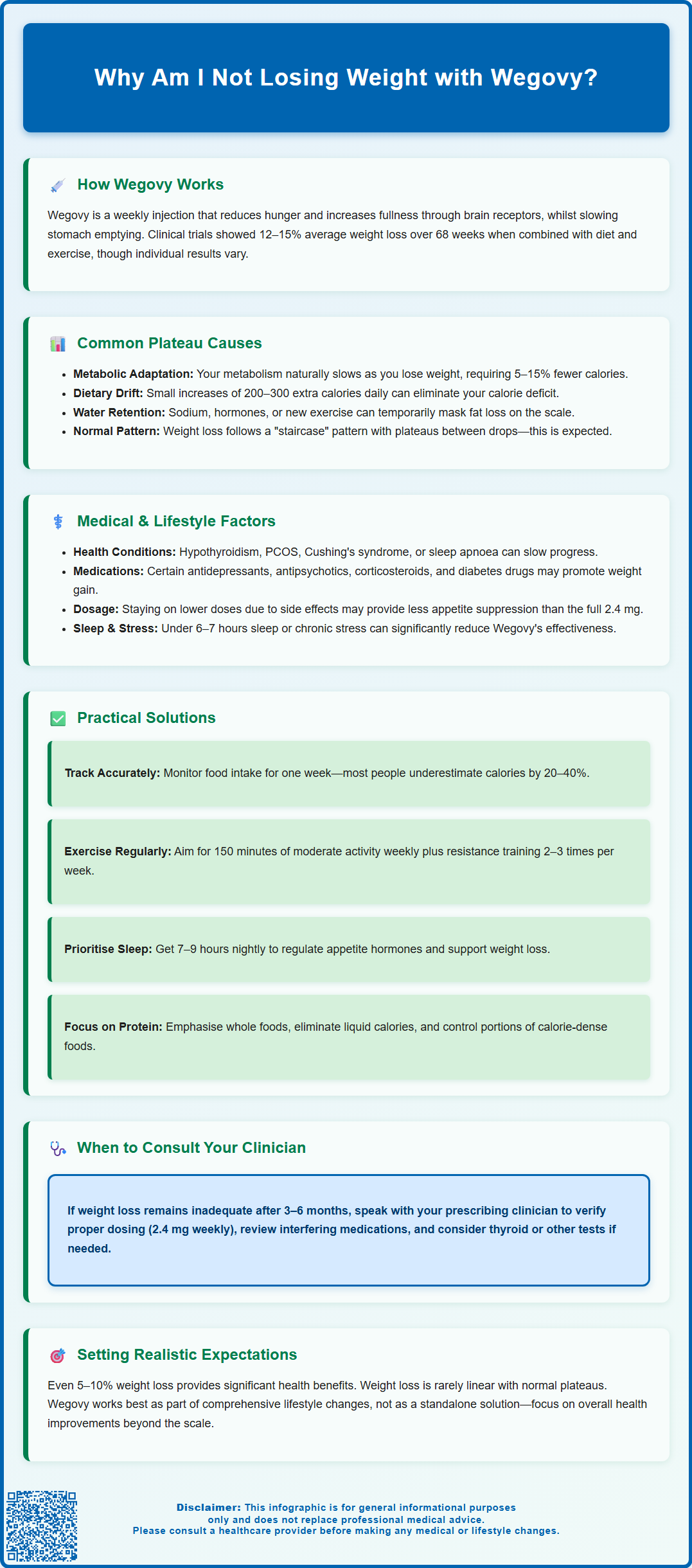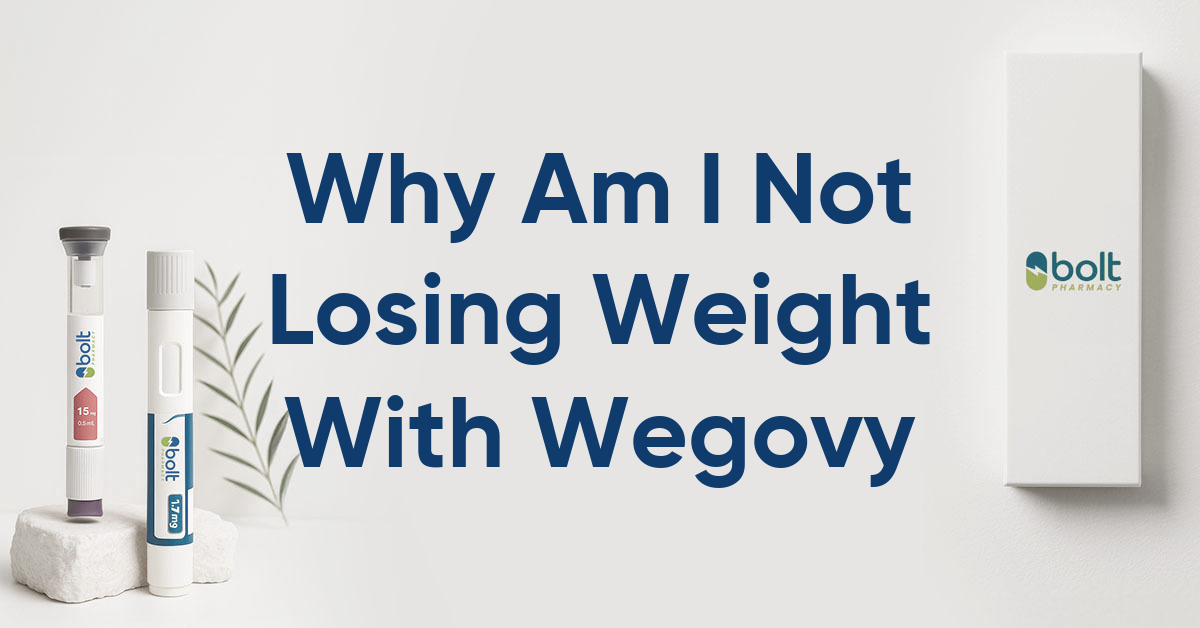Many people prescribed Wegovy (semaglutide 2.4 mg) for weight management experience periods where weight loss slows or stops, despite continuing treatment. Understanding why you're not losing weight with Wegovy requires examining multiple factors, from metabolic adaptation and dietary patterns to underlying medical conditions and medication interactions. Weight loss plateaus are common and don't necessarily indicate treatment failure. This article explores the mechanisms behind Wegovy's action, identifies common barriers to weight loss, and provides evidence-based strategies to optimise your treatment outcomes whilst maintaining realistic expectations about this GLP-1 receptor agonist therapy.
Summary: Weight loss plateaus with Wegovy commonly occur due to metabolic adaptation, dietary adherence changes, fluid retention, underlying medical conditions, or medication interactions, rather than treatment failure.
- Wegovy (semaglutide 2.4 mg) is a GLP-1 receptor agonist that reduces appetite and slows gastric emptying to promote weight loss when combined with lifestyle interventions.
- Metabolic rate decreases as body weight reduces, requiring ongoing calorie deficit adjustments to maintain weight loss progression.
- Medical conditions including hypothyroidism, PCOS, and sleep apnoea, plus certain medications such as some antidepressants and antipsychotics, can impair weight loss effectiveness.
- Systematic review of dietary intake, increased physical activity, adequate sleep, and consultation with prescribing clinicians can help identify and address barriers to weight loss.
- Even modest weight loss of 5–10% provides significant health benefits including improved blood pressure, cholesterol, and reduced cardiovascular disease risk.
Table of Contents
How Wegovy Works for Weight Loss
Wegovy (semaglutide 2.4 mg) is a glucagon-like peptide-1 (GLP-1) receptor agonist licensed by the MHRA for chronic weight management in adults with obesity (BMI ≥30 kg/m²) or overweight (BMI ≥27 kg/m²) with at least one weight-related comorbidity. It mimics the action of naturally occurring GLP-1, a hormone released from the gut after eating.
The medication works through multiple complementary mechanisms to promote weight loss. Primarily, semaglutide acts on receptors in the brain's appetite centres—particularly the hypothalamus—to reduce hunger and increase feelings of fullness (satiety). This leads to a natural reduction in calorie intake without the need for extreme dietary restriction. Additionally, Wegovy slows gastric emptying, meaning food remains in the stomach longer, which prolongs the sensation of fullness after meals and helps reduce between-meal snacking, though this effect may diminish somewhat over time.
Clinical trials, including the STEP programme, demonstrated that participants using Wegovy alongside lifestyle interventions achieved an average weight loss of 12–15% of their initial body weight over 68 weeks in non-diabetic populations, with somewhat lower average losses in people with type 2 diabetes. Individual responses vary considerably—some people lose significantly more, whilst others experience more modest reductions. It's important to understand that Wegovy is not a standalone solution but works most effectively when combined with a reduced-calorie diet and increased physical activity.
Wegovy is administered once weekly via subcutaneous injection, with doses gradually increased over time (0.25 mg → 0.5 mg → 1.0 mg → 1.7 mg → 2.4 mg) to minimise gastrointestinal side effects. The medication requires ongoing use to maintain weight loss, as discontinuation typically results in weight regain. In the UK, NHS use is restricted to specialist weight management services for eligible patients meeting specific criteria, typically for a maximum of 2 years, in accordance with NICE technology appraisal guidance (TA875).

Common Reasons Why Weight Loss May Plateau on Wegovy
Experiencing a weight loss plateau (no weight change over 3-4 weeks despite adherence) whilst taking Wegovy is surprisingly common and does not necessarily indicate treatment failure. Understanding the physiological and behavioural factors behind plateaus can help set realistic expectations and guide appropriate responses.
Metabolic adaptation is one of the primary reasons for plateaus. As you lose weight, your body requires fewer calories to maintain its new, lower weight. Your basal metabolic rate (BMR) decreases proportionally with weight loss, meaning the calorie deficit that initially produced weight loss may no longer be sufficient. This is a normal physiological response, not a sign that Wegovy has stopped working. Research suggests that people who lose significant weight may experience a 5–15% reduction in metabolic rate beyond what would be expected from weight loss alone, though this varies between individuals.
Dietary adherence often becomes less strict over time. In the initial weeks of treatment, many people are highly motivated and carefully monitor their food intake. However, as treatment continues, portion sizes may gradually increase, higher-calorie foods may creep back into the diet, or mindless eating patterns may re-emerge. Even small increases in daily calorie intake—an extra 200–300 calories—can completely offset the calorie deficit needed for continued weight loss.
Fluid retention can temporarily mask fat loss on the scales. Factors such as increased sodium intake, hormonal fluctuations (particularly in women), starting or intensifying exercise (which causes temporary muscle inflammation and water retention), or certain medications can all cause water weight gain that obscures ongoing fat loss. This is why body composition changes—such as how clothes fit or measurements taken around the waist—can sometimes be more informative than scale weight alone.
Finally, many people experience natural weight loss patterns characterised by periods of steady loss followed by plateaus, then further loss. This 'staircase' pattern is well-documented in weight management research and doesn't indicate treatment failure.
Factors That Can Affect Wegovy's Effectiveness
Several medical, lifestyle, and medication-related factors can influence how effectively Wegovy promotes weight loss, and identifying these can help optimise treatment outcomes.
Underlying medical conditions may impair weight loss despite appropriate medication use. Hypothyroidism (underactive thyroid) slows metabolism and can make weight loss significantly more difficult; thyroid function tests should be considered if symptoms or signs suggest hypothyroidism. Polycystic ovary syndrome (PCOS), which affects up to 10% of women of reproductive age, is associated with insulin resistance and can complicate weight management, though many people with PCOS still respond well to GLP-1 therapy. Cushing's syndrome, though rare, causes weight gain and should be considered if other clinical features are present. Sleep apnoea, common in people with obesity, disrupts sleep quality and hormonal regulation, potentially affecting weight management; validated screening tools can help identify those who may need referral for assessment.
Concurrent medications can interfere with weight loss efforts. Some antidepressants (particularly mirtazapine and certain tricyclics), some antipsychotics (especially olanzapine and quetiapine), certain mood stabilisers (such as lithium and valproate), corticosteroids, some diabetes medications (including insulin and sulphonylureas), and certain beta-blockers may promote weight gain or make weight loss more challenging. If you're taking any of these medications, never stop them without consulting your GP—a medication review with your GP or pharmacist may identify weight-neutral alternatives where appropriate.
Inadequate dosing can also affect outcomes. Wegovy requires gradual dose escalation to the maintenance dose of 2.4 mg weekly. Some people remain on lower doses due to side effects, which may provide less appetite suppression. However, the lowest effective dose that provides benefit with tolerable side effects is appropriate for each individual.
Lifestyle factors remain crucial. Insufficient physical activity, poor sleep quality (less than 6–7 hours nightly), chronic stress with elevated cortisol levels, and alcohol consumption (which provides 'empty' calories and may increase appetite) can all reduce Wegovy's effectiveness. Psychological factors, including unaddressed emotional eating, binge eating disorder, or using food as a coping mechanism for stress or low mood, may also limit weight loss despite reduced physiological hunger.
What to Do If You're Not Losing Weight with Wegovy
If you're not achieving expected weight loss with Wegovy, a systematic, evidence-based approach can help identify barriers and optimise your treatment plan.
Review your dietary intake honestly and comprehensively. Many people underestimate their calorie consumption by 20–40%. Consider keeping a detailed food diary for at least one week, recording everything you eat and drink, including portion sizes, cooking methods, and condiments. Several smartphone applications can help track calories accurately. Focus on:
-
Protein intake: Adequate protein helps preserve muscle mass during weight loss. Consider discussing personalised protein targets with a healthcare professional or dietitian, as needs vary based on activity level and health conditions (particularly kidney disease)
-
Whole foods: Prioritise vegetables, fruits, whole grains, and lean proteins over processed foods
-
Liquid calories: Eliminate or minimise sugary drinks, fruit juices, and excessive alcohol
-
Portion control: Use smaller plates and measure portions, especially of calorie-dense foods
Increase physical activity progressively. The UK Chief Medical Officers recommend at least 150 minutes of moderate-intensity activity weekly for general health. This might include brisk walking, cycling, swimming, or any activity that raises your heart rate. Resistance training (weights or bodyweight exercises) 2–3 times weekly helps preserve muscle mass during weight loss, which supports metabolic rate. If mobility is limited, start with chair-based exercises or water-based activities.
Consult your prescribing clinician if weight loss remains inadequate after 3–6 months. They should:
-
Verify you're on the appropriate maintenance dose (2.4 mg weekly)
-
Review your medication list for drugs that may impair weight loss
-
Consider investigations including thyroid function tests if clinically indicated, HbA1c (to assess glucose control), and other tests if specific conditions are suspected
-
Assess for eating disorders or psychological barriers to weight loss
-
Discuss whether referral to specialist weight management services or a dietitian would be beneficial
Address sleep and stress. Poor sleep disrupts hormones that regulate appetite (increasing ghrelin and decreasing leptin), whilst chronic stress elevates cortisol, which promotes abdominal fat storage. Aim for 7–9 hours of quality sleep nightly and consider stress-reduction techniques such as mindfulness, cognitive behavioural therapy (CBT), or relaxation exercises.
Set realistic expectations. Even modest weight loss (5–10%) provides significant health benefits, including improved blood pressure, cholesterol, blood glucose control, and reduced risk of type 2 diabetes and cardiovascular disease. Weight loss is rarely linear; fluctuations and plateaus are normal parts of the process.
Be aware of safety concerns. Seek urgent medical advice if you experience severe, persistent abdominal pain; persistent vomiting; signs of dehydration; or symptoms of gallstones. Report any suspected side effects via the MHRA Yellow Card Scheme (yellowcard.mhra.gov.uk or the Yellow Card app).
Finally, remember that Wegovy is one component of comprehensive weight management, not a standalone solution. The medication works best when integrated with sustainable lifestyle changes, appropriate medical support, and realistic expectations about the pace and pattern of weight loss.
Frequently Asked Questions
How long does it take to see weight loss results with Wegovy?
Most people begin experiencing weight loss within the first 4–8 weeks of Wegovy treatment, with progressive weight reduction over 68 weeks as the dose is gradually increased to the maintenance level of 2.4 mg weekly. Individual responses vary considerably, and weight loss patterns typically follow a 'staircase' pattern with periods of steady loss alternating with plateaus.
Can certain medications prevent Wegovy from working effectively?
Yes, several medications can interfere with weight loss on Wegovy, including some antidepressants (particularly mirtazapine), certain antipsychotics (especially olanzapine and quetiapine), corticosteroids, some diabetes medications, and certain beta-blockers. Never stop prescribed medications without consulting your GP, but a medication review may identify weight-neutral alternatives where clinically appropriate.
What should I do if I've stopped losing weight after several months on Wegovy?
Consult your prescribing clinician to verify you're on the appropriate maintenance dose, review your medication list, and consider investigations such as thyroid function tests if clinically indicated. Simultaneously, reassess your dietary intake using a detailed food diary, increase physical activity progressively, optimise sleep quality, and address stress, as these lifestyle factors significantly influence treatment effectiveness.
The health-related content published on this site is based on credible scientific sources and is periodically reviewed to ensure accuracy and relevance. Although we aim to reflect the most current medical knowledge, the material is meant for general education and awareness only.
The information on this site is not a substitute for professional medical advice. For any health concerns, please speak with a qualified medical professional. By using this information, you acknowledge responsibility for any decisions made and understand we are not liable for any consequences that may result.
Heading 1
Heading 2
Heading 3
Heading 4
Heading 5
Heading 6
Lorem ipsum dolor sit amet, consectetur adipiscing elit, sed do eiusmod tempor incididunt ut labore et dolore magna aliqua. Ut enim ad minim veniam, quis nostrud exercitation ullamco laboris nisi ut aliquip ex ea commodo consequat. Duis aute irure dolor in reprehenderit in voluptate velit esse cillum dolore eu fugiat nulla pariatur.
Block quote
Ordered list
- Item 1
- Item 2
- Item 3
Unordered list
- Item A
- Item B
- Item C
Bold text
Emphasis
Superscript
Subscript










